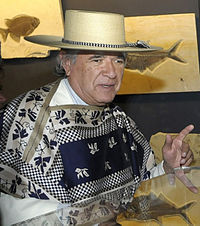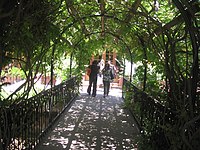Carlos Remigio Cardoen Cornejo (born 1 May 1942, Santa Cruz, Chile) is a Chilean arms dealer, metallurgical engineer, weapons scientist and agricultural businessman.
Carlos Cardoen | |
|---|---|
 Cardoen dressed as a huaso, in 2010 | |
| Born | May 1, 1942 |
| Alma mater | University of Utah, U.S. |
| Occupation(s) | Arms dealer, businessman, metallurgical engineer, and weapon scientist |
| Known for | Arms broker and supplier of explosive weapons to Iraq |

Cardoen rose to prominence in the 1980's amidst the United States arms embargo against Chile,[1] when he became "Pinochet's favourite arms manufacturer".[2]
When Saddam Hussein fell out of favor with the United States in connection with the 1990 invasion of Kuwait Cardoen, who had weapon dealings with Iraq, was accused by the US of zirconium trafficking. Since then he has been on the Interpol wanted list.[2] On various occasions Cardoen has received support from National Congress and the Minister of Foreign Affairs to end the Interpol arrest warrant.[2]
Weapons industry
editAs a weapons expert he ran FAMAE in the late 1980s[citation needed]. He allegedly illegally sold zirconium supplemented armaments to Iraq under Saddam Hussein, exported from the United States, for which he has an international arrest warrant.[3] Yet, Cardoen claims the United States was aware and implicitly consented this trade until Saddam Hussein fell out of favour.[2]
During the height of the Beagle crisis in 1978 Cardoen was contacted by Chilean Air Force commander and member of the Chilean junta, Fernando Matthei and designed on his request a light bomb, that could be dropped from any airforce plane, in only 15 days. When asking Matthei what did he want the bomb for, he reportedly answered: "para joder" ("to mess around").[4]
In the mid-1980 Cardoen bought the Italian swimmer delivery vehicle and minisub manufacturer Cos.Mo.S. His attempts to sell the firm under the table to Iraq ended in scandal and the closure of the company. A warrant was issued for his arrest, but he was never brought to justice.[5]
Cardoen claims Iraq owes him US$50 million from weapon purchases.[2]
Agriculture and tourism
editFrom the 1990s onwards Cardoen has invested capital into the wine, energy, match, fruit juice and tourism businesses in Chile, especially in O'Higgins, his home region. Due to his involvement in cultural and tourism projects he has been awarded the "Premio a lo Chileno" in 2006 and "Orden al Mérito Docente y Cultural Gabriela Mistral" in 2005.[citation needed] He has been suffering from colon cancer for many years.[citation needed]
See also
editReferences
edit- ^ Luengo, Alberto (July 18, 1987). "El embargo de armas crea serios problemas de abastecimiento a la Fuerza Aérea chilena". El País. Retrieved April 12, 2019.
- ^ a b c d e Sepúlveda, Nicolás; Ramírez, Pedro (February 1, 2019). "La historia de los US$50 millones que le quedó debiendo Saddam Hussein a Cardoen por las bombas de racimo". CIPER. Retrieved July 3, 2019.
- ^ Justin Hibbard, "The Chilean Connection", San Francisco Chronicle, 2 March 2003.
- ^ La escuadra en acción. 2004, pg. 187.
- ^ Sutton, H I. "The famous CosMoS CE2F chariot". www.hisutton.com. Covert Shores. Retrieved 27 February 2020.
External links
editMedia related to Carlos Cardoen at Wikimedia Commons
- Museo de Colchagua official website
- El caso Irán-Corfo at the Wayback Machine (archived 27 October 2009)
- "Orden de captura internacional". Archived from the original on 14 February 2005. Retrieved 23 April 2009.
{{cite web}}: CS1 maint: bot: original URL status unknown (link) - The Chilean Connection
- Sumario del Caso Cardoen
- Cardoen Industries
- "Scoop: Ecco come il Sismi doveva rapire Carlos Remigio Cardoen" ("Scoop: Here's how The Sismi was to kidnap Carlos Remigio Cardoen") (in Italian)